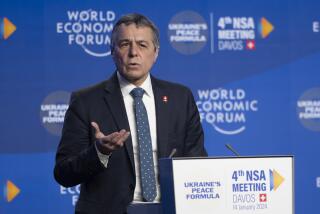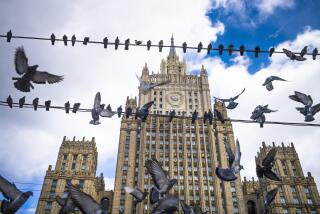Geneva Talks Reopen With a Get-Acquainted Lunch
- Share via
GENEVA — The United States and the Soviet Union began a new round of arms talks Thursday with a get-acquainted working lunch instead of the customary plenary meeting.
The new head of the Soviet delegation, First Deputy Foreign Minister Yuli M. Vorontsov, suggested the lunch at the Soviet Mission because he had not previously met his American counterpart, Ambassador Max M. Kampelman.
The Americans welcomed the move as an indication that this round of talks is likely to be serious and possibly decisive. Accordingly, a news blackout was imposed. Neither side would disclose even how much time the two men spent together.
Vorontsov has replaced Viktor P. Karpov, who spent six years in Geneva, first on negotiations on strategic nuclear weapons and later as chief negotiator opposite Kampelman on space and defensive weapons.
Although the new round of talks opened in the atmosphere of deadlock that has prevailed since the breakdown of the summit meeting last October in Reykjavik, Iceland, there is a feeling among American officials here that a diplomat of Vorontsov’s rank and experience has not come to Geneva empty-handed.
The Americans expect to hear new proposals related to President Reagan’s Strategic Defense Initiative, the “Star Wars” space-based missile defense program, which the Soviets have been trying to halt as their price for reducing nuclear weapons levels.
According to U.S. sources, there has been no give at all in the Soviets’ insistence on a “package deal” that would limit “Star Wars” research and at the same time reduce nuclear weapons levels. This is the way things stood in Iceland, and since then the Soviets have stuck to their guns, despite pressure from the United States and Europe for a separate deal that would eliminate all intermediate-range weapons in Europe--U.S. Pershing 2 and cruise missiles and Soviet SS-20s.
In Iceland, President Reagan offered Soviet leader Mikhail S. Gorbachev a 10-year extension of the 1972 Anti-Ballistic Missile Treaty, which is due to expire this year, but he refused to accept any additional limits on testing and deployment of the “Star Wars” system. This continues to be what is described as the President’s bedrock, non-negotiable position.
So far the Soviets have insisted that “Star Wars” development be limited to “laboratory testing.” If Vorontsov has brought new proposals from Moscow that go beyond this and open the door for agreement on a wider scale, then Reagan may be faced with some hard choices that are likely to determine whether there will be a new arms control agreement during his presidency.
More to Read
Sign up for Essential California
The most important California stories and recommendations in your inbox every morning.
You may occasionally receive promotional content from the Los Angeles Times.










